Managing property can be a demanding endeavor, as it requires the owner to attend to multiple tasks and matters. Recognizing the challenges this entails, property owners have the option to designate authority to undertake these tasks to another individual or an entity. This is done through a letter of authorization. This letter serves as an official confirmation that the authorized person has the owner’s consent to execute specific tasks, make decisions, or represent them in specified circumstances. This ensures that the property owner’s interests are protected in their absence.
In this article, we will delve into the concept of an authorization letter, explore its applications, and dissect the essential components it should encompass.
A letter of authorization (abbreviated as LOA) is a written document in which you, as the property owner, grant permission or authority to another individual or entity to act on your behalf in various matters related to the property. The authorized party can be referred to as an “agent” or a “representative.”.
The letter outlines the scope of authorization, the tasks the authorized person or entity is allowed to perform, and the duration of the authorization. This letter is invaluable in scenarios where you cannot personally attend to the tasks. In such cases, the designated agent will typically have to present this document to any third party involved in the transaction, activity, or task.
Sample Letters
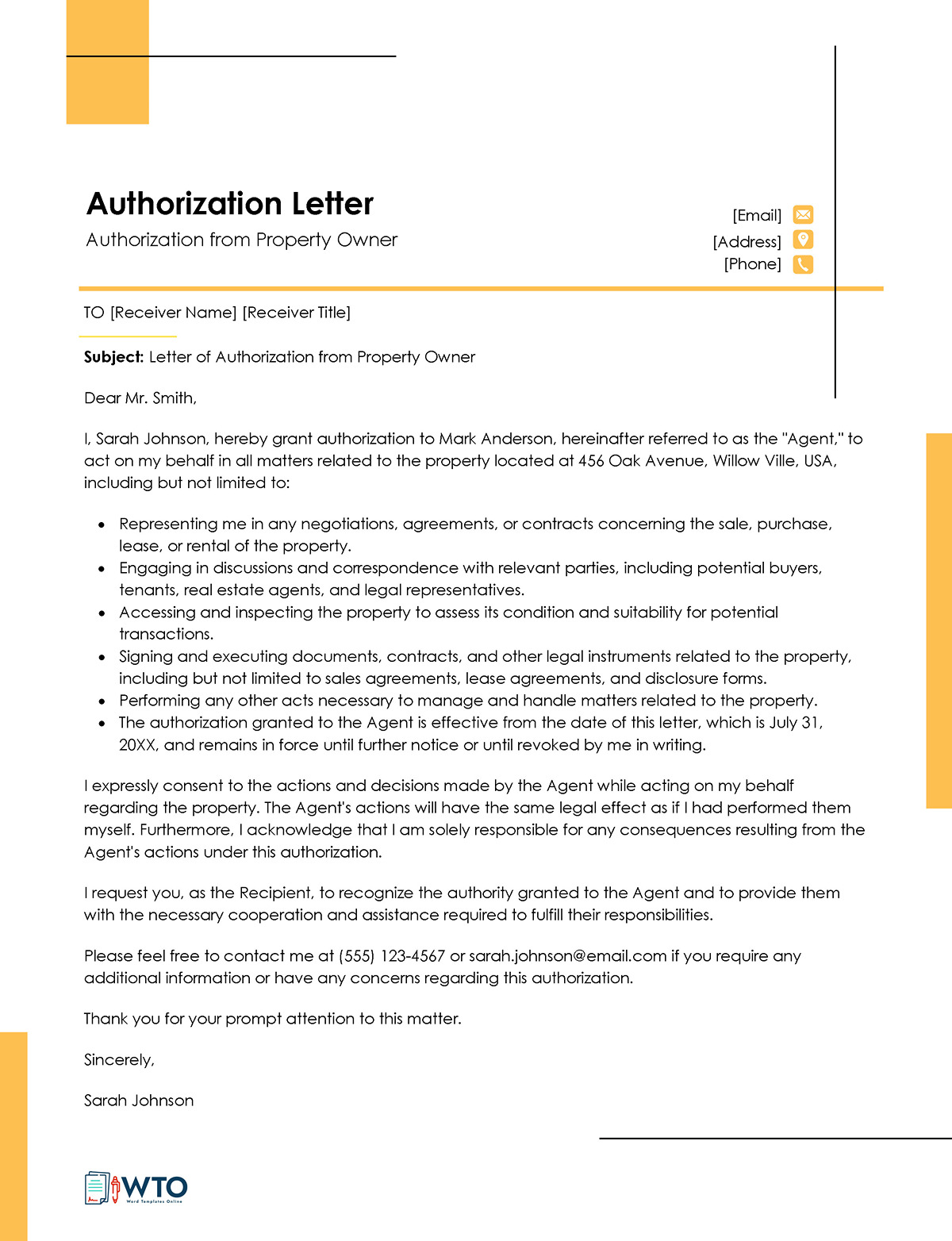
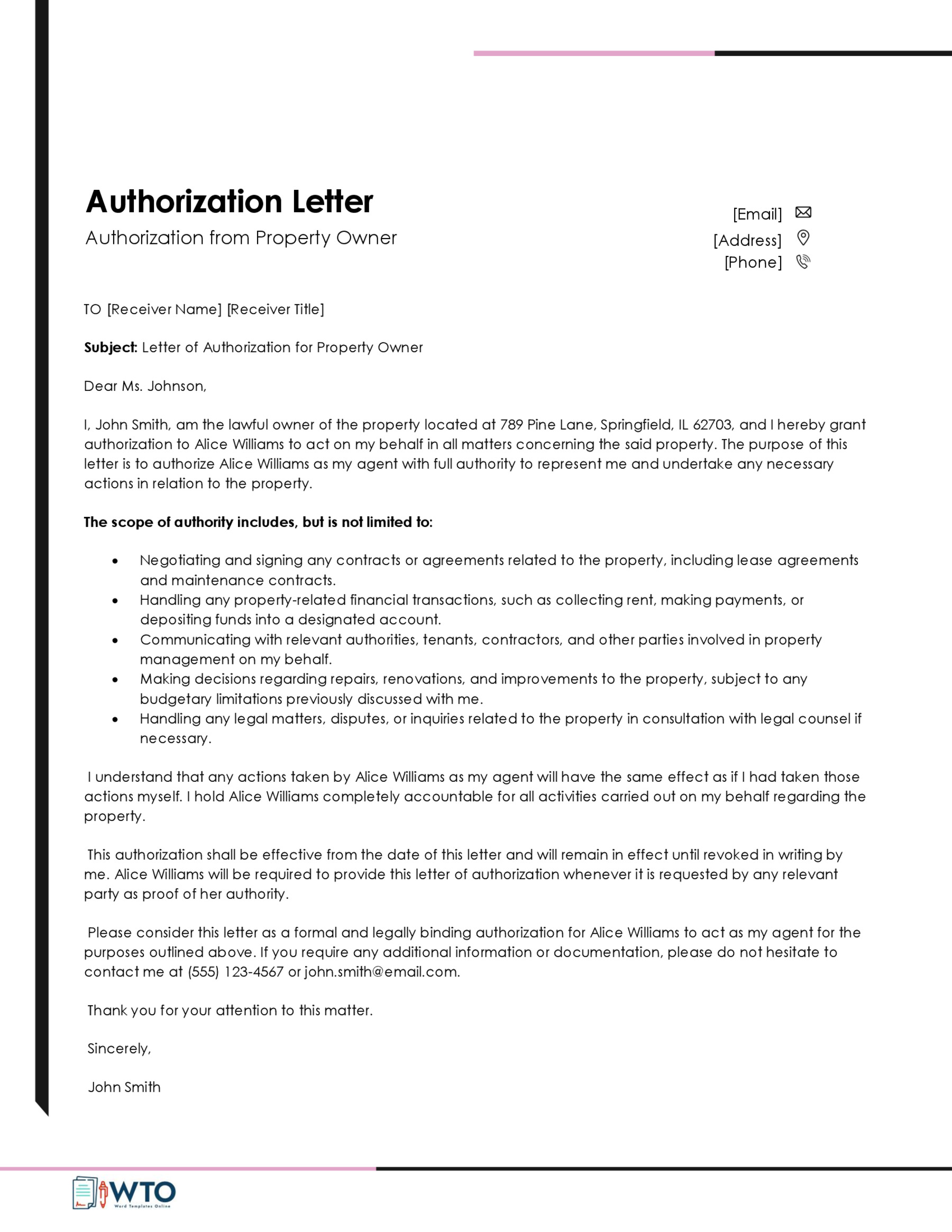
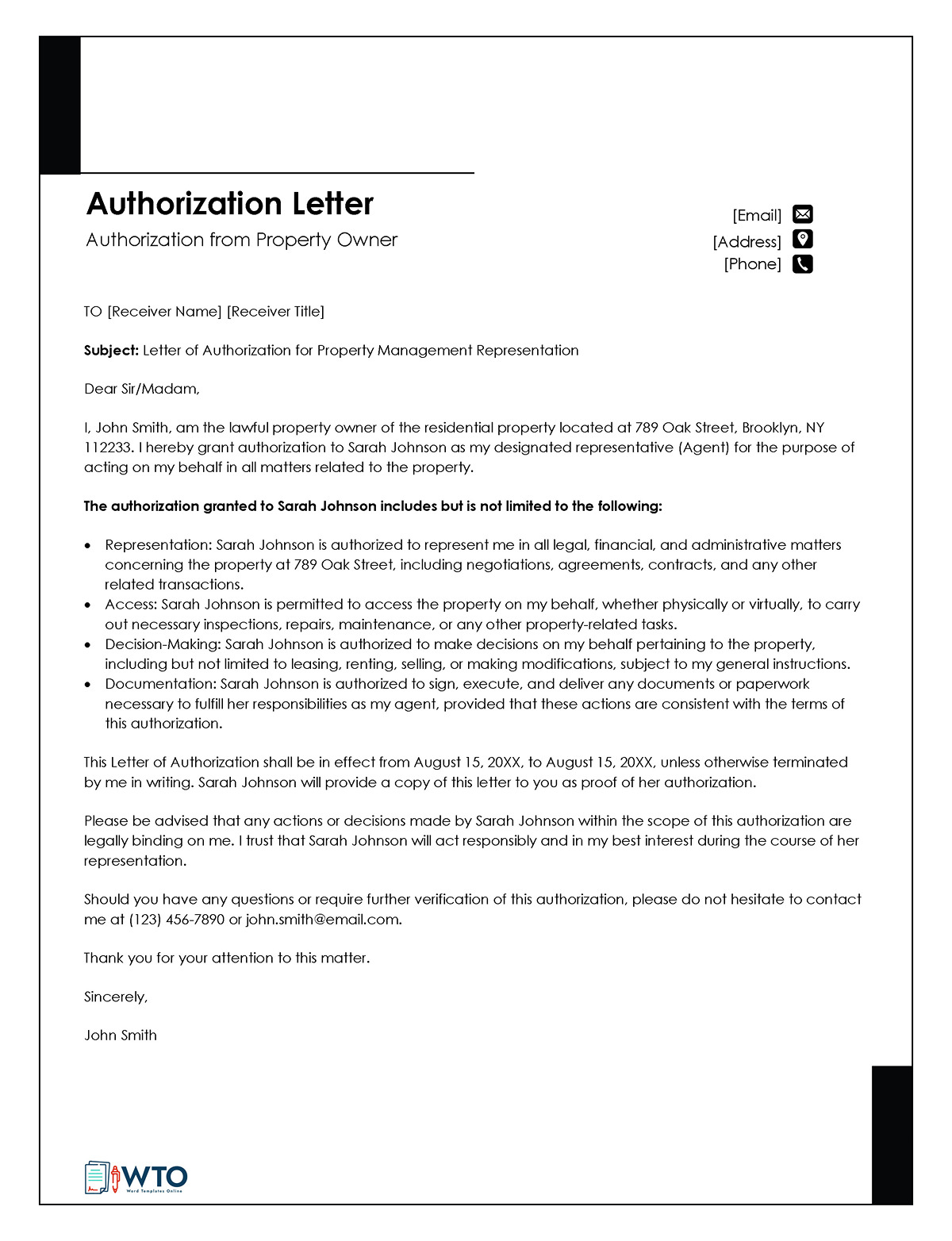
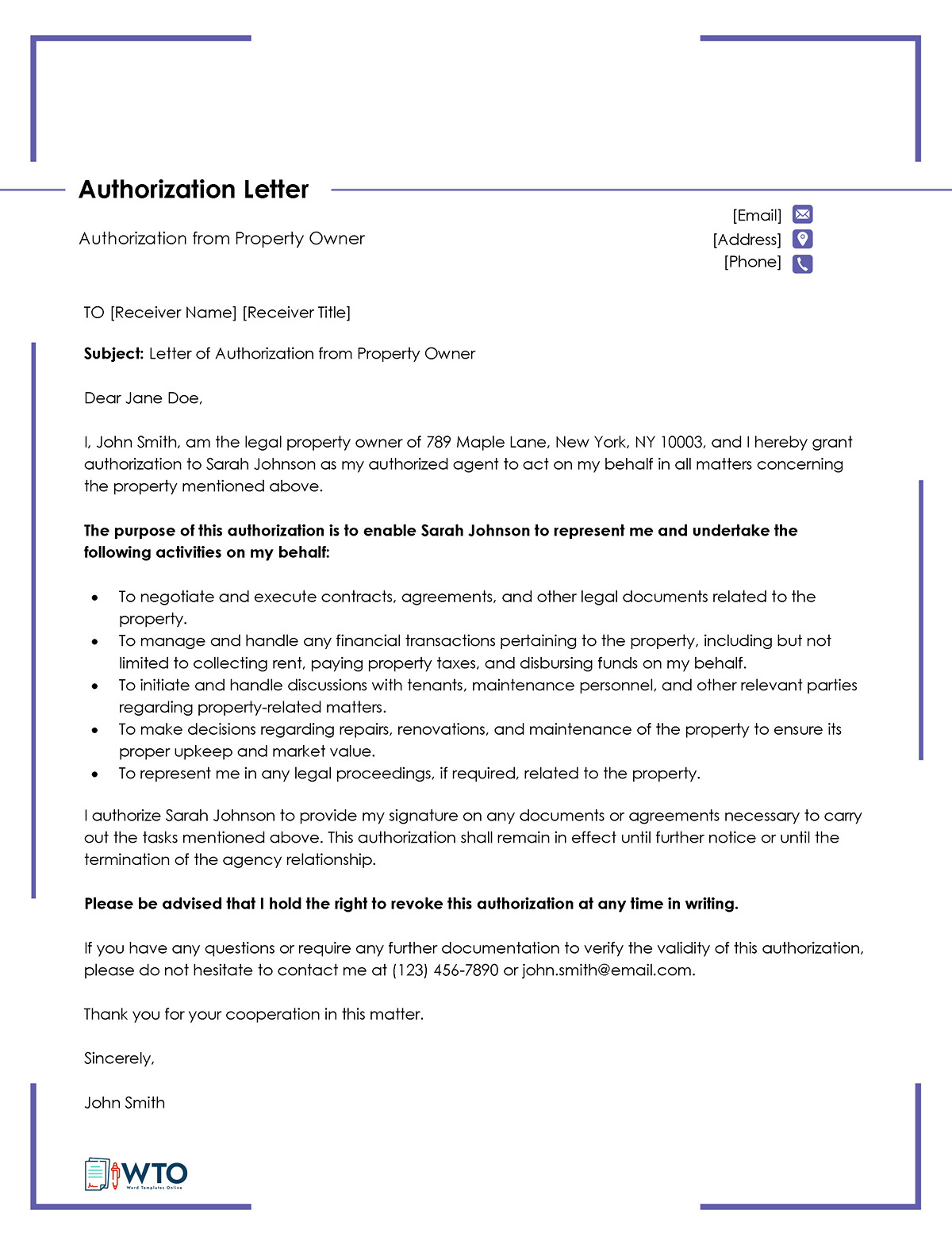
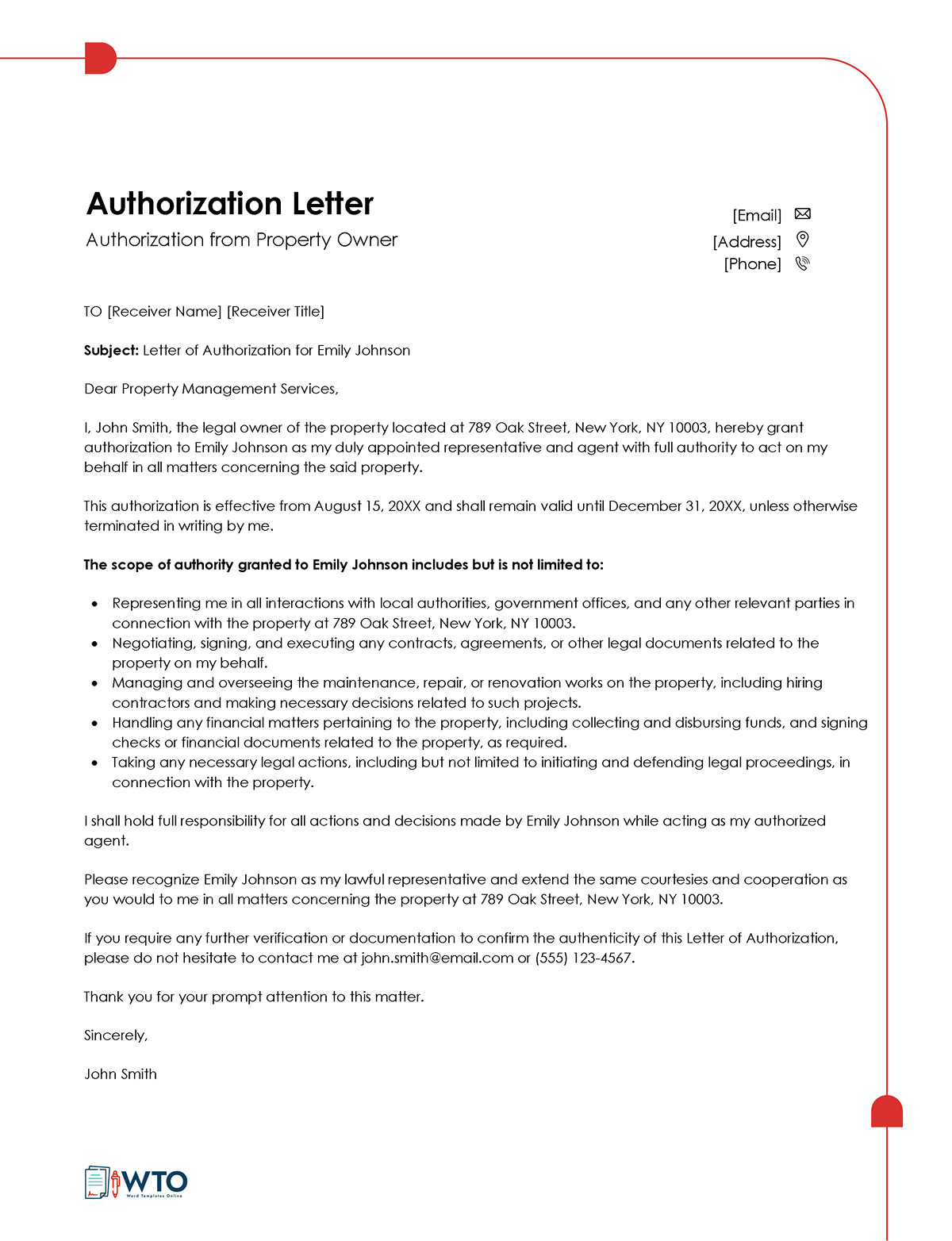
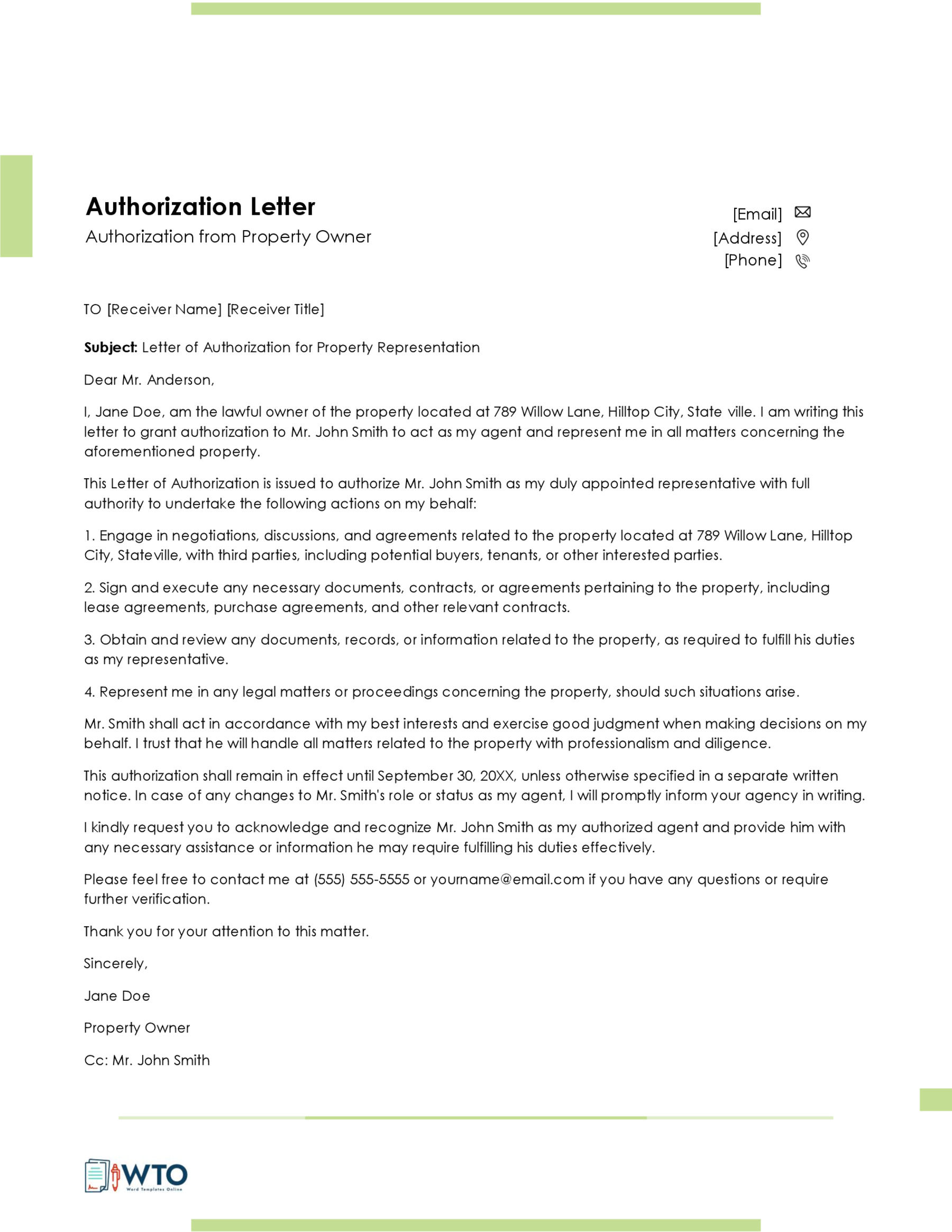
When You May Need an Authorization Letter
The scope of the letter is remarkably extensive. This is because it can be used to designate responsibilities related to property inspections, contract signings, financial dealings, and legal matters.
Common situations wherein a LOA from a property owner may be required include:
Property management
If you, as the property owner, cannot manage the property yourself, you can authorize a property management company or an individual to handle an array of tasks. Such tasks include tenant correspondence, maintenance, rent collection, and handling repair concerns.
Property transaction
During property transactions, such as sales or purchases, the letter serves a pivotal role. By conferring authorization to an agent, you facilitate representation in your stead. This allows you to handle other commitments while the transaction is being completed.
Legal documentation
The authorized person may represent you in legal proceedings, dealings with homeowners’ associations, or interactions with local authorities. You may authorize them to sign contracts, agreements, or affidavits related to the property. Such documentation includes lease agreements, maintenance contracts, or renovation agreements.
Financial transactions
In some cases, you might need someone to manage financial matters related to the property. Such transactions include paying property taxes, utility bills, or mortgage payments. By bestowing authorization, you streamline these financial transactions, ensuring the property’s fiscal aspects remain soundly managed.
What to Include in an Authorization Letter
Creating a comprehensive and well-structured letter is pivotal to its successful utilization in diverse scenarios.
To ensure clarity and effectiveness, the letter should include the following key components:
Your information
The letter begins with your personal identification details. Include your full legal name, address, contact details, and other pertinent information identifying you as the authorizing party. The recipient uses this information for identification and communication purposes. This information, therefore, establishes that you are the property owner and indicates the available means of communication in the future.
Date
Clearly state the date the letter is written. The date clarifies when the authorization was issued and establishes a timeline for the entire process. Additionally, the date is important for record-keeping and verification purposes. Ensure to capture it in the month-date-year format.
Recipient’s information
This section of the letter addresses the recipient of the letter with their full name, address, and any other relevant contact information. It may also indicate their designation and affiliated company name, if applicable. This information ensures that the letter is delivered to the appropriate person without any delays or misdirection.
Salutation
A salutation is a formal greeting. It sets the tone of the letter as an official document. So, use a respectful salutation to address the recipient.
EXAMPLE
“Dear [Recipient’s Name]” in cases where you know the name of the recipient.
However, you can use “To Whom It May Concern” when you do not know the recipient’s name.
Introductory statement
The introduction statement briefly describes the purpose of writing the letter. You can do so by declaring yourself as the property owner and explicitly stating that you are authorizing the agent to act on your behalf.
Agent’s information
It is important to provide the agent’s identification to clarify who will be receiving your authority via the letter. Ensure to provide the agent’s name and contact information. This information can then be used to facilitate future correspondence between the parties involved.
Authorization’s scope
Outline all the tasks, actions, or responsibilities the agent is authorized to undertake. Be specific and descriptive. This can help prevent any unintended or unauthorized activities and potential confusion during representation.
Duration of authorization
State the period during which the authorization is valid. You can specify the start date and end date or indicate an indefinite/open-ended authorization until further notice. This duration specifies the timeframe when the agent can make decisions or perform tasks specified in the letter.
Conditions or limitations (if any)
Specify any limitations on the authorized person’s actions. This section prevents the agent from misusing the authority you have awarded them. Consequently, this prevents conflicts and misunderstandings regarding how the agent is expected to handle their assigned responsibilities.
Contact information
To end the body of the letter, provide the recipient with your contact information. Include your active phone number and current email address, so they can easily contact you if they have any questions or need further clarification about the authorization or related matters.
Closing
Close the letter with a courteous, complimentary closing, such as “Sincerely,” followed by your printed name. This closing acts as a formal and appreciative gesture to the recipient for using their time to read the letter and cooperating to ensure the specified tasks are completed as requested.
NOTE
If sending a physical letter, sign it by hand. If sending an electronic letter, include a scanned copy of your signature. A signature authenticates the validity and credibility of the authorization. You can also have the letter notarized if you are authorizing the agent to handle sensitive or critical tasks or decisions. A notary public will confirm your willingness to consent to the transfer of the specified authority. In turn, this further authenticates and enhances the credibility of the letter.
Template of Letter of Authorization
[Your Name]
[Your Address]
[City, State, Zip Code]
[Email Address]
[Phone Number]
[Date]
[Recipient Name]
[Recipient Address or Company Name]
[City, State, Zip Code]
Subject: Letter of Authorization for [Specific Purpose, e.g., Property Management, Selling Property]
Dear [Recipient Name or Company Name],
I, [Your Name], the owner of the property located at [Property Address], hereby grant [Name of Authorized Person or Entity] the authority to act on my behalf in matters relating to the specified property. This letter serves as a formal authorization for [Name of Authorized Person or Entity] to undertake the following actions:
[List of Specific Actions the Authorized Person is Permitted to Take, e.g., negotiating and signing rental agreements, overseeing property maintenance and repairs, making decisions regarding the sale of the property.]
This authorization is granted with the understanding that [Name of Authorized Person or Entity] will act in my best interest and in compliance with all relevant laws and regulations. The scope of this authorization includes but is not limited to the actions listed above. Any actions taken outside of this scope must receive prior written consent from me.
The authorization is valid from [Start Date] until [End Date], unless otherwise revoked or extended in writing by me. Any and all acts carried out by [Name of Authorized Person or Entity] within the scope of this authorization during the specified period are to be considered as approved and authorized by me.
Please recognize and accept this letter as a legitimate authorization for [Name of Authorized Person or Entity] to act on my behalf regarding the property mentioned above. Should you require any further information or clarification, please do not hesitate to contact me directly.
Thank you for your attention to this matter.
Sincerely,
[Your Signature]
[Your Printed Name]
Sample Authorization Letter
Subject: Authorization for Property Management Services
Dear Cityville Property Management,
I, Jane Doe, owner of the residential property located at 789 Maple Avenue, Cityville, CV, 67890, hereby authorize Cityville Property Management, and its designated agents and employees, to manage the aforementioned property on my behalf.
This authorization includes the following specific powers and responsibilities:
- Tenant Management: To advertise the property for rent, screen potential tenants, execute leasing agreements, collect rent, and manage tenant relations including the handling of complaints and the enforcement of lease terms.
- Maintenance and Repairs: To oversee and authorize necessary maintenance and repair work on the property, ensuring that the property remains in good condition and complies with all relevant housing laws and regulations. This includes the authority to hire contractors, oversee work, and approve related expenditures within a budget limit of $2,000 per incident without further consent.
- Financial Management: To handle all financial transactions related to the property, including the payment of utility bills, property taxes, insurance premiums, and service charges. Provide monthly financial statements detailing income, expenses, and net profit/loss.
- Legal Matters: To represent the property owner in all matters requiring legal attention, including but not limited to tenant disputes and compliance with local housing regulations.
This authorization is effective immediately and will remain in effect until December 31, 20XX, unless earlier terminated in writing by either party with at least 30 days’ notice.
Please accept this letter as my formal authorization to Cityville Property Management to act in my capacity concerning the management of my property located at 789 Maple Avenue, Cityville, CV, as outlined above.
I trust that Cityville Property Management will act in the best interests of both the property and its owner, maintaining the highest standards of professionalism and compliance with all applicable laws and regulations.
Should you require any further information or clarification, please do not hesitate to contact me directly.
Thank you for your attention to this matter and for your cooperation.
Sincerely,
[Jane Doe’s Signature]
Jane Doe
Letter Templates
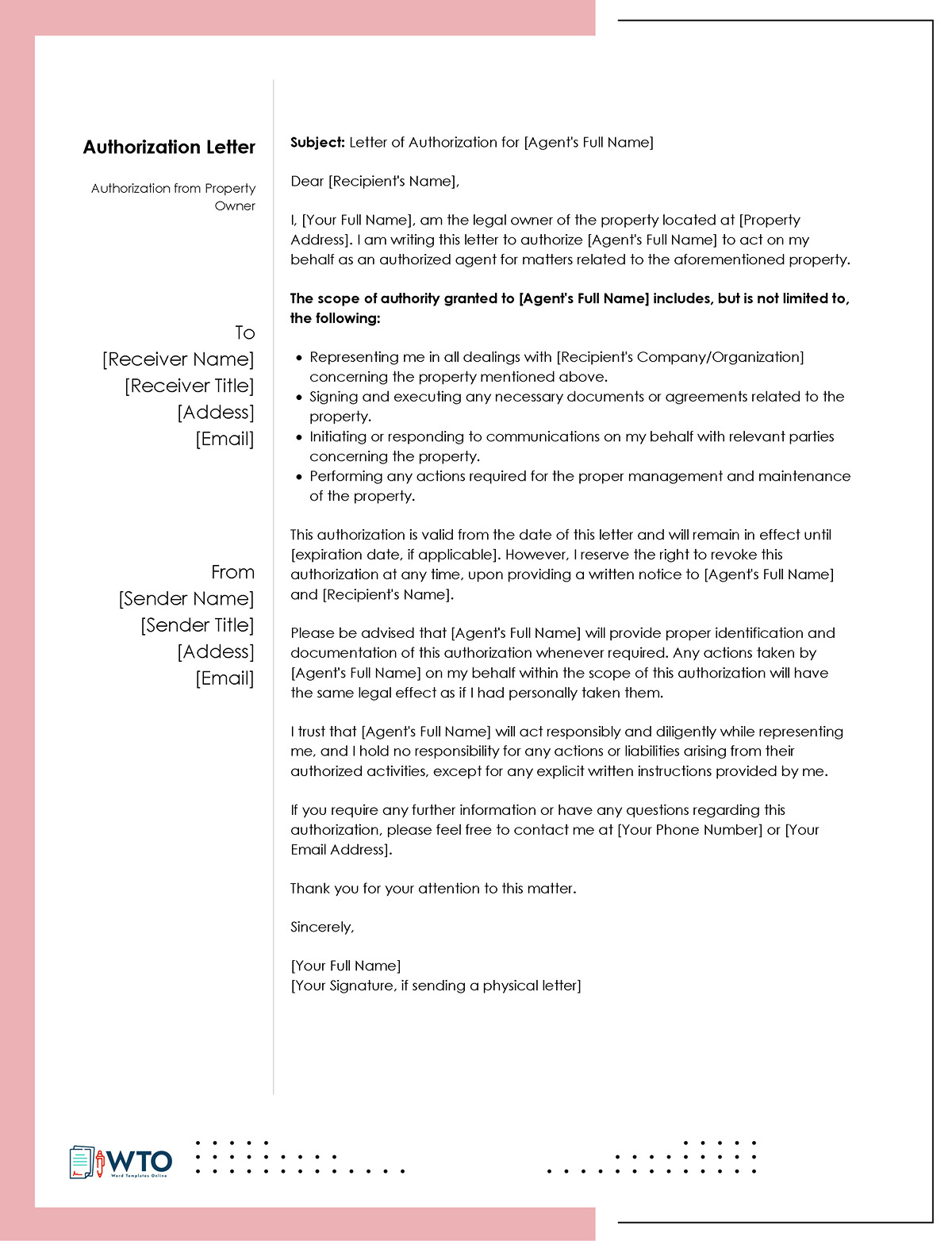
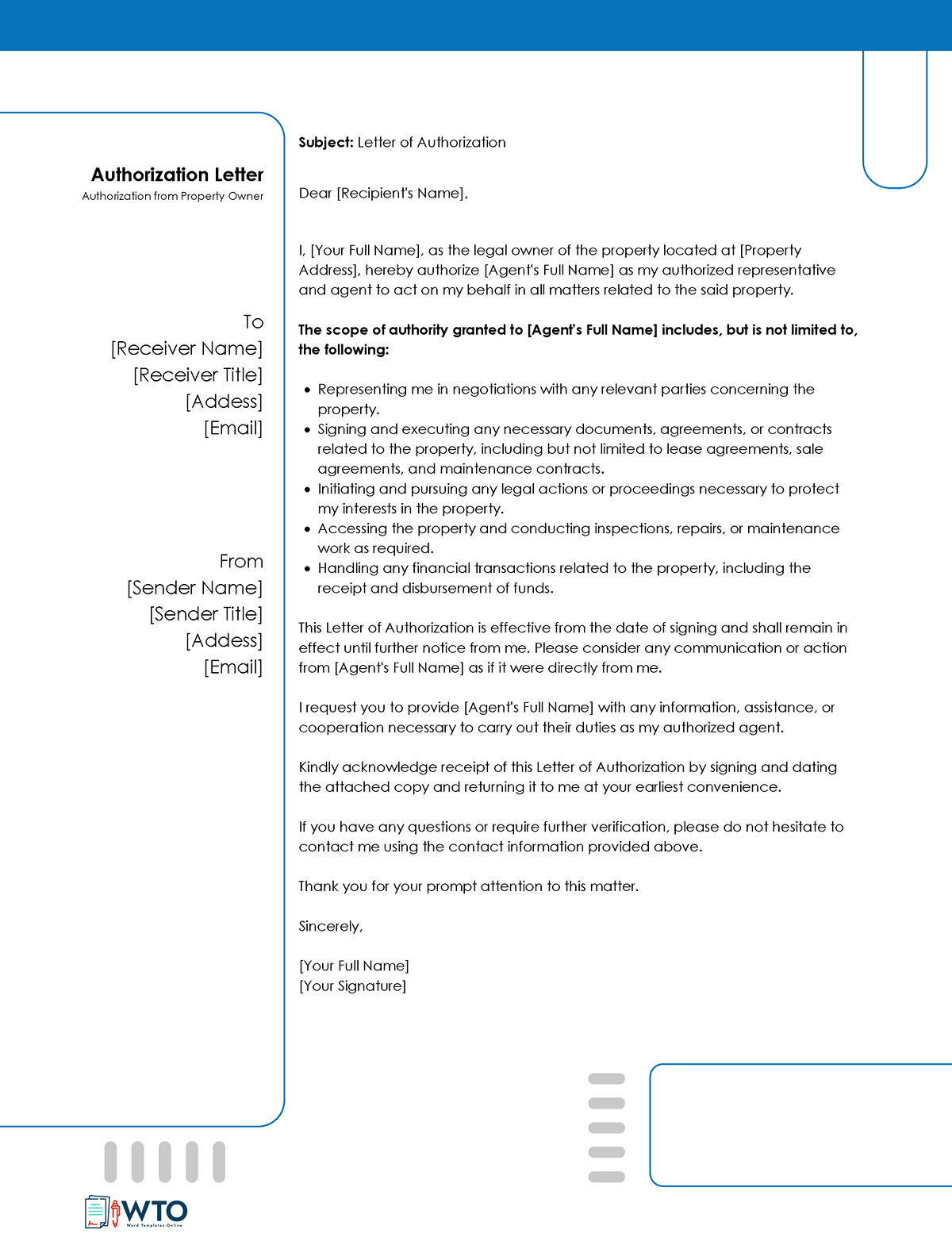
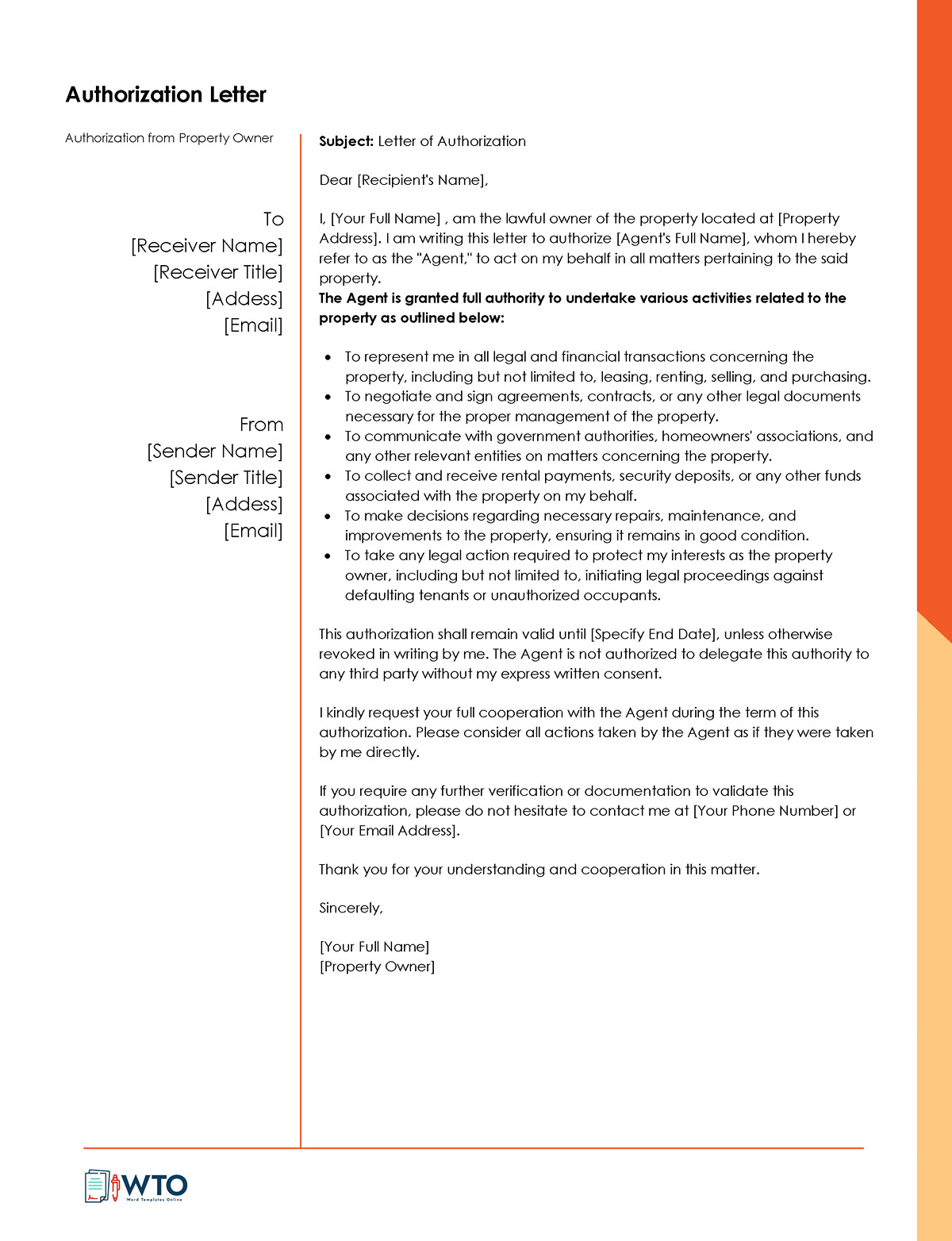
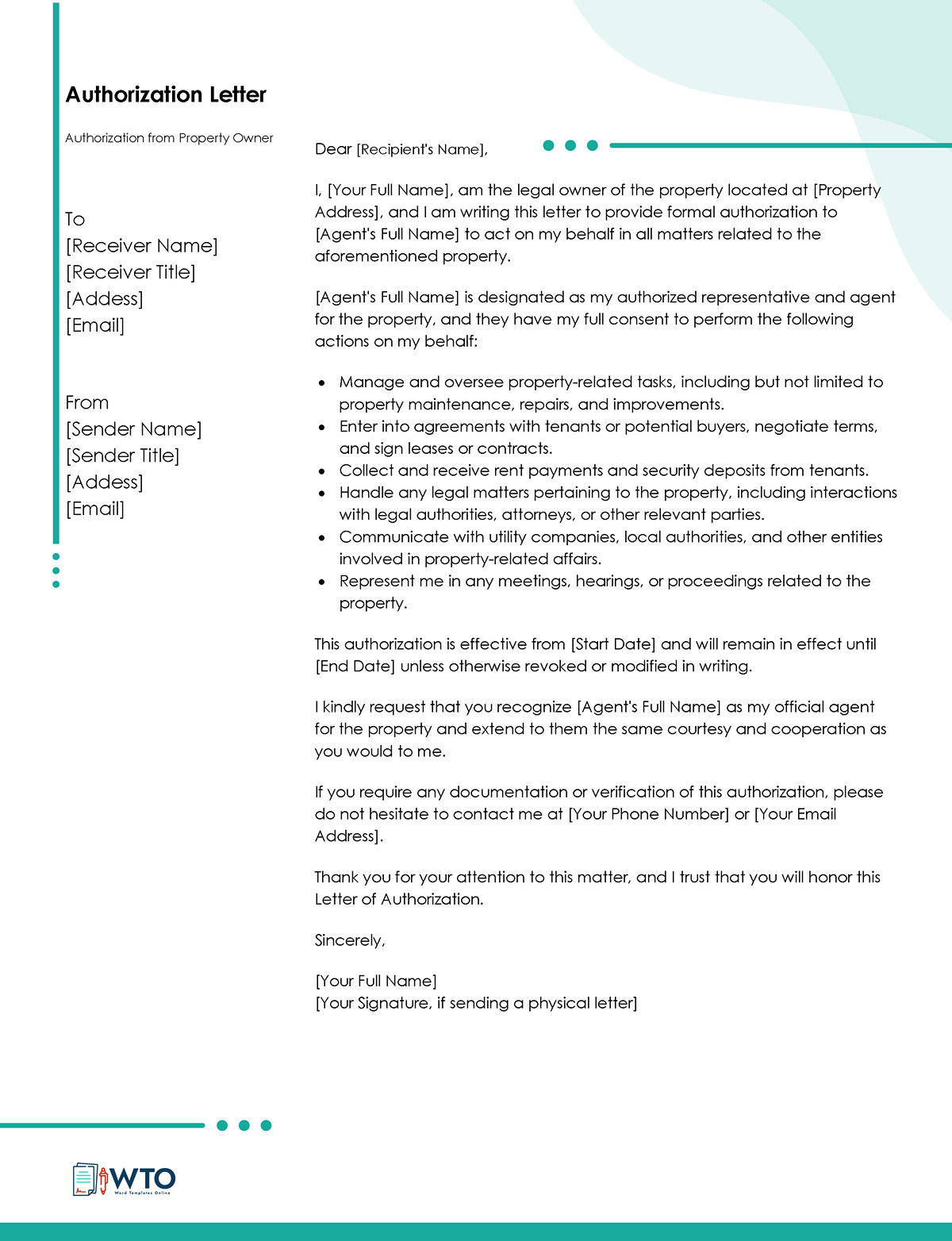
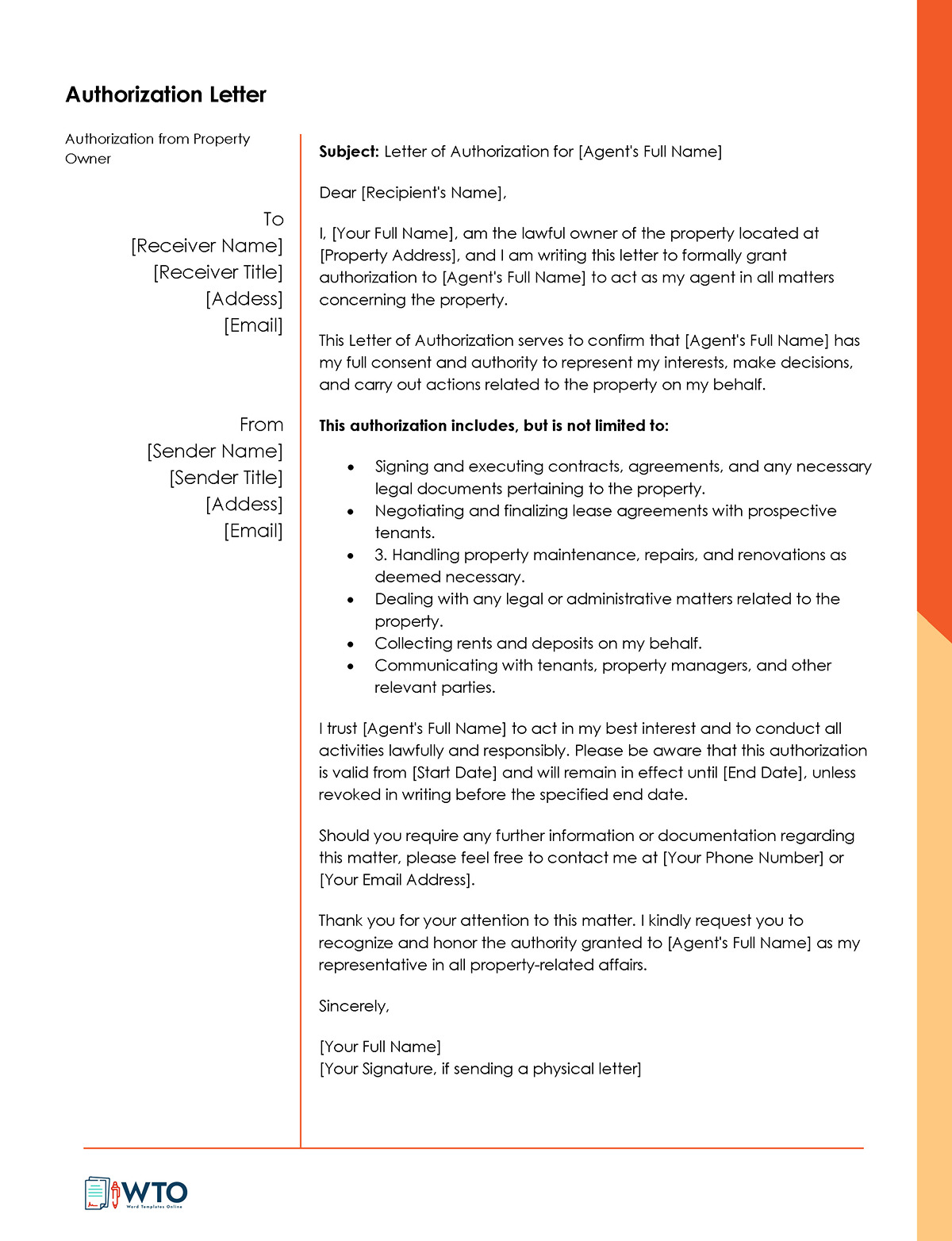
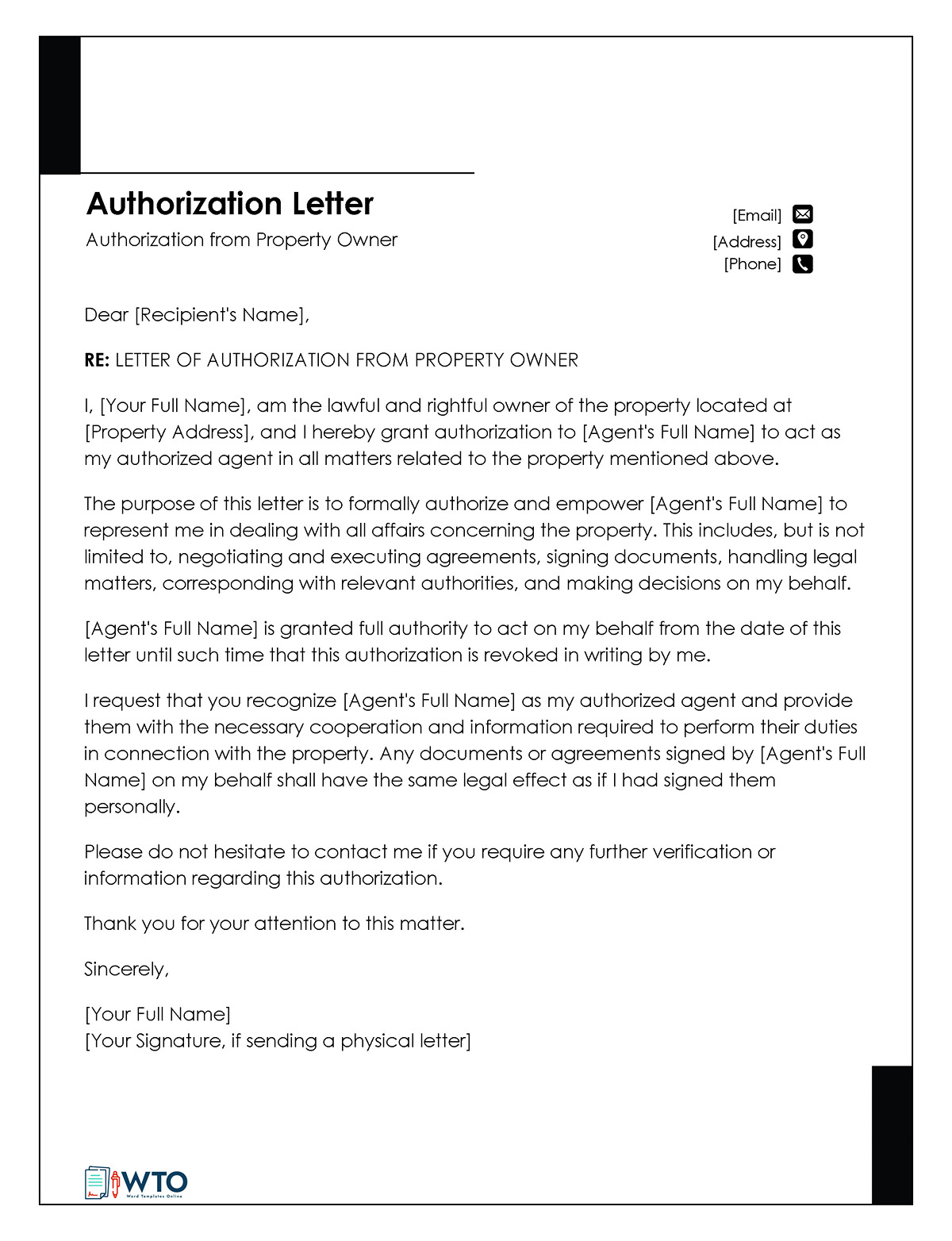
Conclusion
The power to delegate authority through a letter of authorization has proven to be a crucial tool for property owners seeking efficient and effective management of their assets. An effective letter of authority will document your and your agent’s personal information, a well-defined scope of authorization, a clear timeframe, and any necessary limitations. This information streamlines the delegation process, enhances communication, and safeguards your interests as the property owner. It is recommended to consult legal counsel when drafting or signing such letters, especially in more complex or high-stakes situations. It is important to note that the letter is a legal document. Therefore, both parties should fully understand the terms and consequences before signing.











